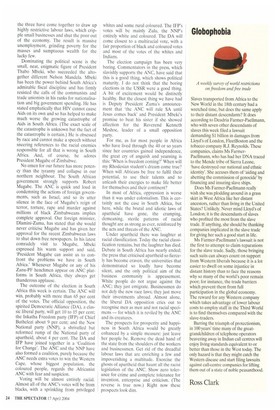Globophobia
A weekly survey of world restrictions on freedom and free trade Slaves transported from Africa to the New World in the 18th century had a wretched time, but does the same apply to their distant descendants? It does according to Deadria Farmer-Paellmann, who with seven other descendants of slaves this week filed a lawsuit demanding $1 billion in damages from Lloyd's of London, FleetBoston and the tobacco company R.I. Reynolds. These companies, claims Ms FarmerPaellmann, who has had her DNA traced to the Mende tribe of Sierra Leone, 'have destroyed our national and ethnic identity'. She accuses them of 'aiding and abetting the commission of genocide' by financing and insuring slave ships.
Does Ms Farmer-Paellmann really wish she was plodding around in a grass skirt in West Africa like her distant ancestors, rather than living in the United States? Unlikely. Never mind Lloyd's of London; it is the descendants of slaves who profited the most from the slave trade. If anything, she should be thanking companies implicated in the slave trade for giving her such a good start in life.
Ms Farmer-Paellmann's lawsuit is not the first to attempt to claim reparations for the slave trade. Sadly, those bringing such suits can always count on support from Western liberals because it is a lot easier to dwell on some injustice in distant history than to face the reasons why so many of the world's poor remain poor; for instance, the trade barriers which prevent them from full participation in the global economy. The reward for any Western company which takes advantage of lower labour costs to employ staff in the Third World is to find themselves compared with the slave-traders.
Barring the triumph of protectionism, in 100 years' time many of the greatgrandchildren of telephone operators beavering away in Indian call centres will enjoy living standards equivalent to or better than those in the West today. The only hazard is that they might catch the Western disease and start filing lawsuits against call-centre companies for lifting them out of a state of noble peasanthood.
Ross Clark


































































 Previous page
Previous page